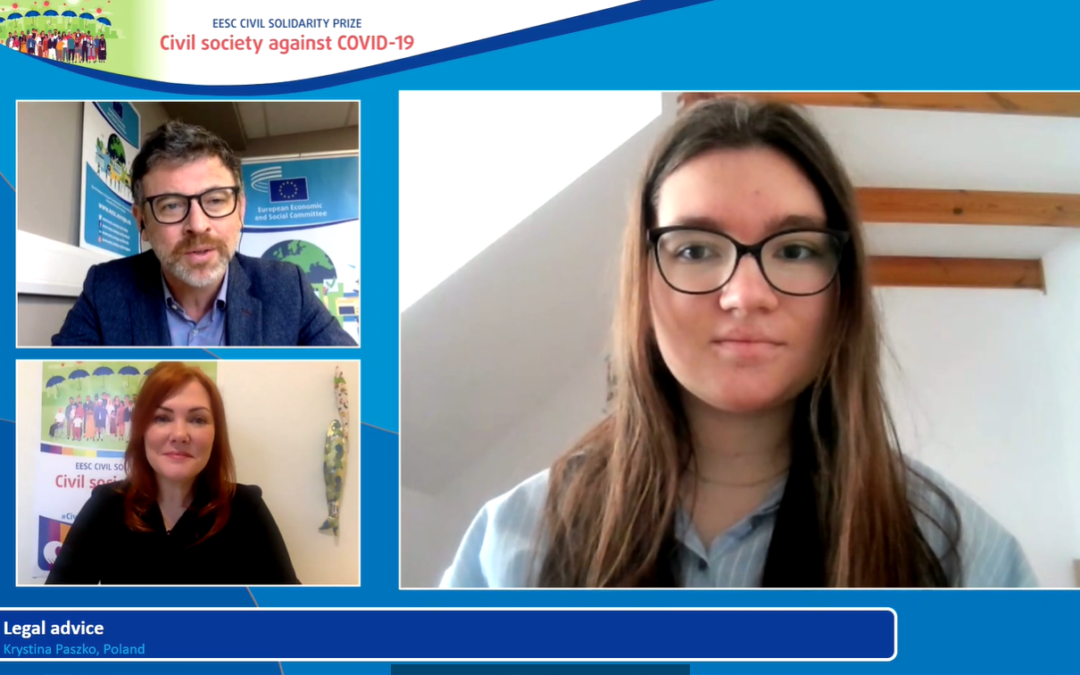Polish high school student Krystyna Paszko has won an EU award for her initiative last year to create a fake online shop that victims of domestic violence can use to seek help without alerting their abuser.
In April last year, the then 17-year-old from Warsaw set up “Rumianki i bratki” (Camomiles and Pansies), which presented itself as a “natural cosmetics shop”. However, when someone placed an “order” and provided their address, the service notified police.
Victims can also be put in touch with a psychologist and other support services.
Women's rights groups report a surge in domestic violence during the coronavirus lockdown. One helpline has seen a 50% rise in calls from victims seeking support https://t.co/kpSyDGz2rJ
— Notes from Poland 🇵🇱 (@notesfrompoland) April 16, 2020
Today, Paszko was awarded the Civil Solidarity Prize by the European Economic and Social Committee (EESC), a consultative body of the EU that represents civil society groups.
The EESC hailed “Rumianki i bratki” as “an outstanding example of extraordinary solidarity during the COVID-19 crisis”, and called Paszko – who receives a €10,000 prize along with her award – an “inspiration” to others.
Speaking during the awards announcement today, Paszko said that her service has so far helped around 350 people and thanked the dozens of psychologists and lawyers who have supported the initiative.
— European Economic and Social Committee (@EU_EESC) February 15, 2021
The EESC and Paszko also noted that efforts to support victims of domestic violence have been particularly needed during the pandemic, when lockdown measures have seen reported rises in abuse in many countries, including Poland.
“The project clearly responds to specific needs in the era of lockdown, which for victims of domestic violence has often meant confinement with their abuser in a small space,” wrote the EESC, quoted by RMF24. They also hailed Paszko for creating a form of help easily accessible to young people.
Speaking last year to the Polityka weekly, Paszko said that she had initially set up the initiative to help any friends who were in need. After it proved popular, she decided to expand the idea, which is modelled on a similar service set up in France.
Explaining how it works, Paszko said that “if someone asks about cosmetics, it means that they are in a bad situation, but for now they only want support”.
Staff at “Rumianki i bratki” then maintain contact with the person, using coded language (such as “Please write something more about your skin”) to avoid detection. If someone places an order for home delivery, it is a signal that their situation has escalated and the police should be called.
The issue of domestic violence has received particular attention in Poland over the last year. In July, the justice minister began the process of seeking to withdraw the country from a European convention on preventing violence against women, arguing that it “promotes LGBT”.
The move received support from Poland’s Catholic church. However, the prime minister delayed the decision by referring it to the Constitutional Tribunal for a ruling.
The justice ministry also, however, put forward legislation that would make it possible to immediately separate perpetrators of domestic violence from their victims. It has received support from all parties in parliament apart from the far right.
In August, a leaked study commissioned by the government revealed that 63% of women in Poland report having suffered some form of domestic violence. The authors also noted a “concerning” acceptance of violence among a significant minority of the public.
In November – after a man was acquitted of raping his 14-year-old relative because the judge ruled that the victim did not resist – Poland’s left-wing opposition party launched an effort to expand the legal definition of rape to include cases where there is a lack of explicit consent.
Main image credit: EU_EESC/Twitter (screenshot)

Daniel Tilles is editor-in-chief of Notes from Poland. He has written on Polish affairs for a wide range of publications, including Foreign Policy, POLITICO Europe, EUobserver and Dziennik Gazeta Prawna.




















